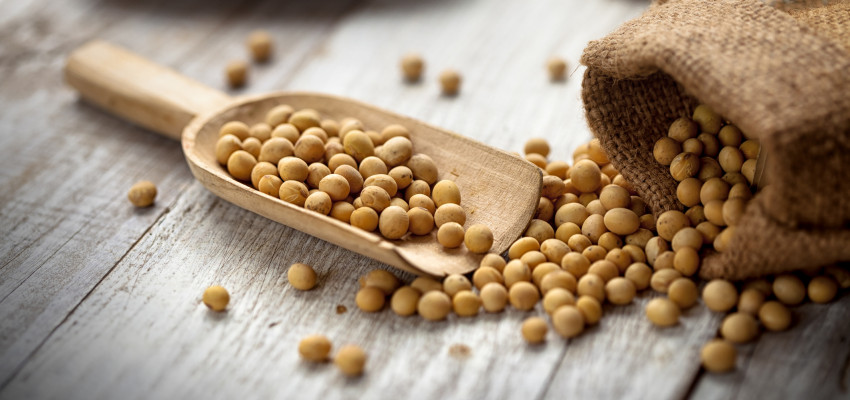By Dixie Vogel on March 18, 2020
Does soy increase estrogen in males?

As a food blogger, I get asked a lot of questions. Many I can answer confidently, but not this one—are “soyboys” a real thing? In other words, does consuming soy feminize males?
I had my hunches, but I advocate using science to sort through fact and fiction. And no surprise, there’s plenty of both fact and fiction out there regarding soy.
Soy is often touted for high-quality protein and nutrients, but the nutritional value isn’t what people question. Soy has an abundance of isoflavones, a plant estrogen (or phytoestrogen) that behaves similarly to a weak type of human estrogen.
Isoflavones can bind to estrogen receptors. The isoflavones potentially give soy mild-estrogenic properties (from mimicking estrogen) or anti-estrogenic properties (from blocking the more potent human estrogen). Individual factors like how much soy is consumed or existing hormone levels will impact how soy might affect a given individual.
The challenge of understanding soy research as a consumer is reconciling what seems to be inconsistent conclusions. I asked Dr. Mark Messina, executive director of the Soy Nutrition Institute, why soy research so often seems contradictory.
Messina explained apparent inconsistencies are an issue with nutrition research in general. Food studies often include just a few subjects and individuals vary. Furthermore, if people are asked to follow specific protocols for eating, they may not always comply through the entire study, and it’s very challenging to control for all the outside variables.
“In the case of soy, much of the confusion is because of the contradictory results between animal and human studies. In regard to soy and feminization, the clinical studies are consistent.” Messina says. “Results show no effect on testosterone or estrogen.”
Most concerns about soy’s possibility of feminizing men do seem to be extrapolated from animal studies. Mice are readily available research subjects but metabolize soy differently than humans. Animal studies also usually involve much higher amounts of soy than people eat. So, the results from animal studies aren’t necessarily translatable to recommendations for people.
Fortunately, we don’t have to rely on animal studies. Soy has been extensively studied with humans.
“Soy does not lower testosterone or affect other indications of feminization.” Dr. Messina noted, citing more than 35 clinical trials included in a meta-analysis of soy research.
Clinical studies also show no effects on sperm or semen. Plus, soy protein supplementation leads to similar gains in muscle mass and strength in men undergoing resistance exercise training (weightlifting) as whey and dairy and animal protein supplementation.”
I wondered how much soy someone would realistically need to consume to expect side effects.
“Two case reports described single individuals that developed feminizing effects in response to soy. A 60-year-old man drank three quarts of soymilk per day and a 19-year-old vegan consumed 12 to 20 servings daily. Their isoflavone intake was nine times higher than that of a typical Japanese man [following a traditional, soy-heavy diet]. In the clinical studies, even large amounts of soy (greater than four servings per day) do not have adverse effects. But no one should consume greater than four servings per day because that indicates too much emphasis on one food.” Messina advised.
Most people’s soy intake will never approach a gallon of soymilk daily to reach 12 servings. Despite the widely publicized anomalies, reasonable soy consumption hasn’t been found to feminize men, even if they eat plenty of soy burgers. Based on the collected evidence from multiple clinical studies, men can feel free to include soy in their diet without worry.
Learn More About Soy


